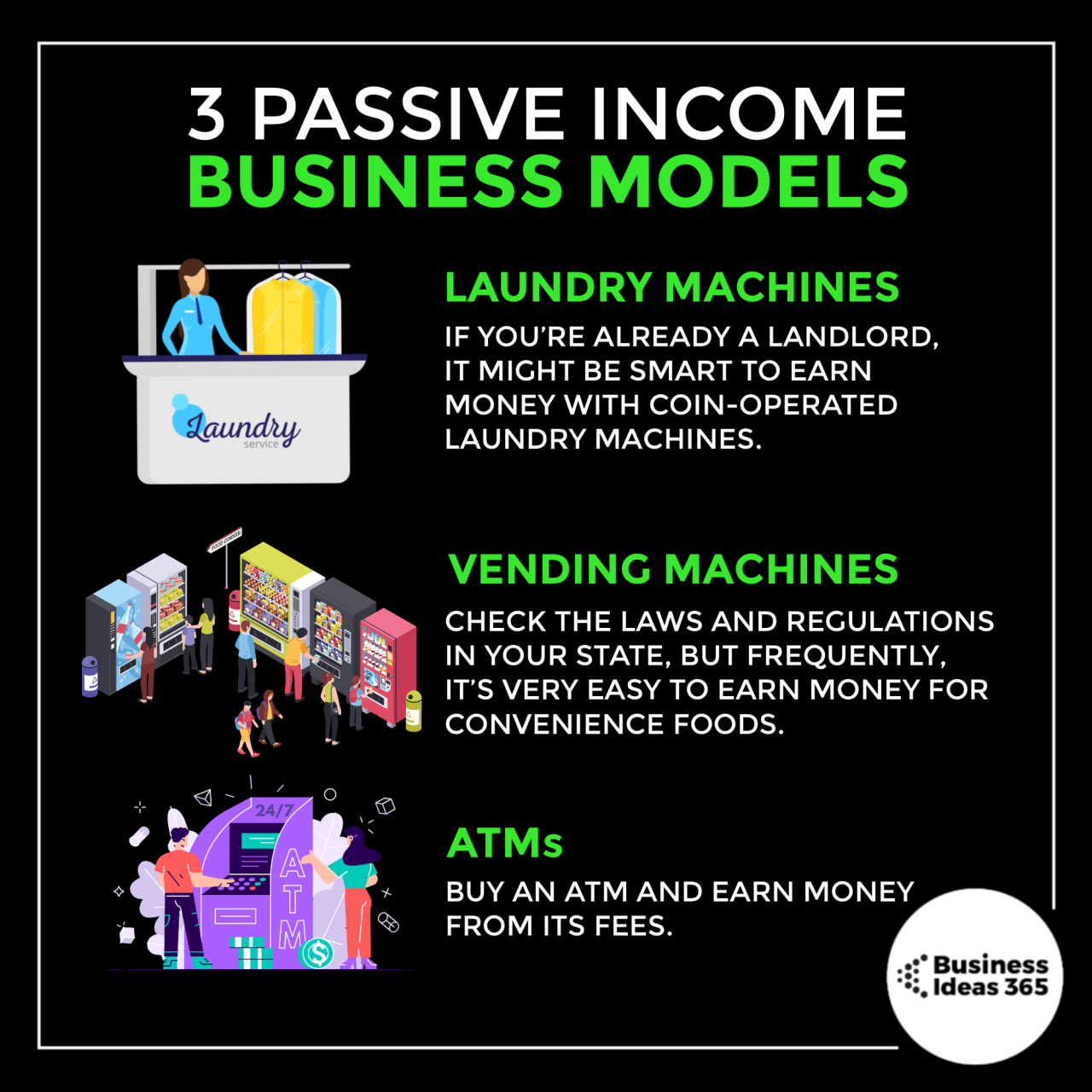Passive income business models that actually work: A Comprehensive Guide

Exploring the realm of Passive income business models that actually work, this introduction aims to captivate readers with a detailed yet engaging narrative. From defining passive income to discussing various business models, this overview sets the stage for an insightful journey into the world of generating income passively.
As we delve deeper into the specifics of affiliate marketing, e-commerce dropshipping, online courses, digital products, and real estate investments, readers will gain a comprehensive understanding of how these models can truly work for sustainable passive income.
Passive income business models
Passive income refers to earnings derived from a business or investment that require little to no effort to maintain. It is an essential component of a successful business as it allows for financial stability and growth without constant active involvement.
Incorporating passive income streams into a business can provide a steady source of revenue, diversify income sources, and create opportunities for scalability and expansion.
Types of passive income business models
- Affiliate marketing: Earn commissions by promoting other companies' products or services.
- Online courses: Create and sell educational content to a global audience.
- Rental properties: Generate income through leasing out real estate properties.
- Dividend stocks: Receive regular payouts from investments in dividend-paying stocks.
- Membership sites: Charge users a subscription fee for access to exclusive content or services.
Benefits of incorporating passive income streams into a business
- Diversification: Reduce reliance on a single source of income by establishing multiple revenue streams.
- Scalability: Passive income models can be easily scaled up to increase profitability without proportional increases in effort.
- Financial stability: Create a consistent source of income that can help weather economic downturns or fluctuations in the market.
- Freedom: Passive income allows for flexibility and freedom to pursue other interests or ventures while still generating revenue.
Affiliate marketing

Affiliate marketing is a popular passive income business model where individuals earn a commission by promoting other companies' products or services. This is done through unique affiliate links provided to the affiliate, and when a customer makes a purchase through that link, the affiliate earns a commission.
Successful Affiliate Marketing Strategies
- Content Marketing: Creating valuable content that incorporates affiliate links naturally can drive traffic and conversions.
- Email Marketing: Building an email list and sending targeted campaigns with affiliate links can lead to higher conversion rates.
- Social Media Marketing: Leveraging social platforms to promote products and engage with followers can result in affiliate sales.
- Optimization: Ensuring that content is optimized for search engines can help attract organic traffic and increase affiliate sales.
Comparison of Affiliate Marketing Programs
| Affiliate Program | Potential for Passive Income |
|---|---|
| Amazon Associates | High potential due to wide product range and brand recognition. |
| ClickBank | Potential varies based on niche and product quality. |
| ShareASale | Offers a variety of products and merchants, providing good passive income opportunities. |
E-commerce dropshipping
Dropshipping is a popular business model that allows entrepreneurs to sell products without holding inventory. Instead, the products are shipped directly from the supplier to the customer. This eliminates the need for storage space and upfront investment in inventory, making it a great option for generating passive income.
Dropshipping Business Model
- Choose a niche: Select a niche market with high demand and low competition to increase your chances of success.
- Find reliable suppliers: Partner with reputable suppliers who can fulfill orders efficiently and provide quality products.
- Set up an online store: Create an e-commerce website or use platforms like Shopify or WooCommerce to showcase your products.
- Market your store: Implement marketing strategies such as social media advertising, influencer partnerships, and search engine optimization to drive traffic to your store.
- Manage customer service: Provide excellent customer service to build trust and loyalty with your customers.
Popular Platforms for Dropshipping
- Shopify: One of the most popular platforms for setting up a dropshipping store, offering a wide range of features and integrations.
- WooCommerce: A customizable e-commerce platform that works seamlessly with WordPress, allowing for easy dropshipping integration.
- BigCommerce: Another option for creating a dropshipping store with built-in features for managing products and orders.
Tips for Managing a Dropshipping Business
- Automate processes: Use tools and software to automate order processing, inventory management, and customer communication to save time and streamline operations.
- Monitor trends: Stay updated on industry trends and consumer preferences to adjust your product offerings and marketing strategies accordingly.
- Optimize product listings: Write compelling product descriptions, utilize high-quality images, and optimize for search engines to attract more customers.
- Provide value: Offer unique products, excellent customer service, and fast shipping to stand out from competitors and build a loyal customer base.
Online courses and digital products

Creating and selling online courses or digital products can be a lucrative way to generate passive income. By leveraging your expertise and knowledge, you can reach a global audience and earn money while you sleep.
Platforms for hosting online courses and selling digital products
When it comes to hosting online courses, platforms like Teachable, Udemy, and Thinkific are popular choices. These platforms provide all the tools you need to create, market, and sell your courses to a wide audience. For selling digital products such as eBooks, templates, or software, platforms like Gumroad, SendOwl, and Shopify can be great options.
These platforms handle payment processing, delivery, and customer support, allowing you to focus on creating quality content.
Marketing strategies to promote online courses and digital products
To effectively market your online courses and digital products, you can utilize various strategies such as content marketing, social media advertising, email campaigns, and partnerships with influencers. Creating valuable content related to your courses or products can help attract potential customers and establish your credibility.
Leveraging social media platforms like Facebook, Instagram, and LinkedIn can also help you reach a wider audience. Additionally, email campaigns can be an effective way to nurture leads and convert them into paying customers. Collaborating with influencers in your niche can help you tap into their existing audience and drive sales.
Real estate investments
Real estate investments can be an excellent source of passive income due to the potential for appreciation in property value, rental income, and tax benefits. By investing in real estate, individuals can generate ongoing cash flow without actively managing the properties on a daily basis.
Comparison of different real estate investment strategies
- Rental properties: Purchasing residential or commercial properties to rent out to tenants can provide a steady stream of passive income through rental payments. However, managing tenants and property maintenance can require active involvement.
- Real Estate Investment Trusts (REITs): Investing in REITs allows individuals to own shares in real estate portfolios without directly owning properties. REITs often pay dividends to shareholders, offering passive income with lower risk and less hands-on management.
- Crowdfunding platforms: Online platforms allow investors to pool their resources to invest in real estate projects, such as residential developments or commercial properties. This strategy provides opportunities for passive income without the need for substantial capital or property management responsibilities.
Challenges and benefits of investing in real estate for passive income
- Benefits:
- Potential for high returns: Real estate investments have the potential for long-term appreciation in property value, providing investors with significant returns.
- Diversification: Investing in real estate can diversify an investment portfolio, reducing overall risk.
- Tax advantages: Real estate investors may benefit from tax deductions, depreciation allowances, and other tax advantages that can lower their overall tax liability.
- Challenges:
- Market volatility: Real estate markets can be subject to fluctuations, impacting property values and rental income.
- Property management: Dealing with tenants, maintenance issues, and property management can be time-consuming and require active involvement.
- Initial capital requirements: Purchasing real estate typically requires a significant initial investment, which may be a barrier for some investors.
Concluding Remarks

In conclusion, the discussion on Passive income business models that actually work sheds light on the diverse opportunities available for individuals seeking to establish reliable streams of passive income. By exploring the nuances of each model, readers are equipped with the knowledge to make informed decisions and embark on a path towards financial independence.
FAQ Compilation
What is the significance of passive income in business?
Passive income plays a crucial role in providing financial stability and security by generating income with minimal ongoing effort.
How can one effectively manage a dropshipping business for passive income?
Effective management of a dropshipping business involves selecting reliable suppliers, optimizing product listings, and providing excellent customer service to ensure a steady stream of passive income.
What are some successful strategies for affiliate marketing?
Successful affiliate marketing strategies include creating high-quality content, building a strong online presence, and strategically promoting products or services to target audiences.
Which real estate investment strategy offers the most potential for generating passive income?
Rental properties are often cited as a lucrative real estate investment strategy for generating consistent passive income through rental payments.

